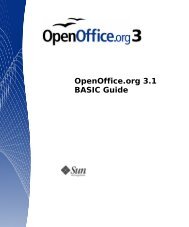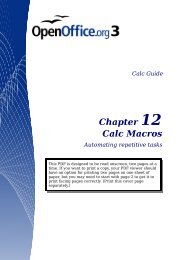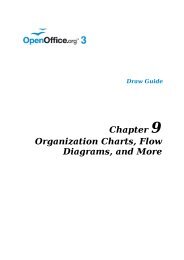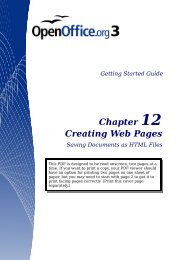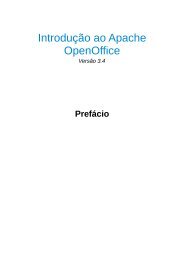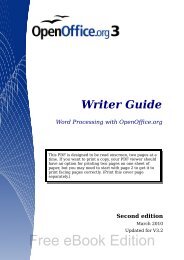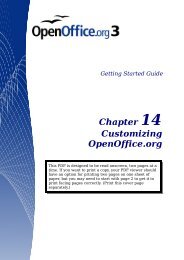OpenOffice.org BASIC Guide - OpenOffice.org wiki
OpenOffice.org BASIC Guide - OpenOffice.org wiki
OpenOffice.org BASIC Guide - OpenOffice.org wiki
You also want an ePaper? Increase the reach of your titles
YUMPU automatically turns print PDFs into web optimized ePapers that Google loves.
Overview of a Basic Program<br />
In addition to linking individual lines, in <strong>OpenOffice</strong>.<strong>org</strong> Basic you can use colons to divide one line into several<br />
sections, so that there is enough space for several expressions. The assignments<br />
a = 1 a = a + 1 a = a + 1<br />
can be written as follows:<br />
a = 1 : a = a + 1 : a = a + 1<br />
Comments<br />
In addition to the program code to be executed, an <strong>OpenOffice</strong>.<strong>org</strong> Basic program can also contain comments<br />
that explain the individual parts of the program and provide important information that can be helpful at a later<br />
point.<br />
<strong>OpenOffice</strong>.<strong>org</strong> Basic provides two methods for inserting comments in the program code:<br />
All characters that follow an apostrophe are treated as comments:<br />
Dim A ' This is a comment for variable A<br />
The keyword Rem, followed by the comment:<br />
Rem This comment is introduced by the keyword Rem.<br />
A comment usually includes all characters up to the end of the line. <strong>OpenOffice</strong>.<strong>org</strong> Basic then interprets the<br />
following line as a regular instruction again. If comments cover several lines, each line must be identified as a<br />
comment:<br />
Dim B ' This comment for variable B is relatively long<br />
' and stretches over several lines. The<br />
' comment character must therefore be repeated<br />
' in each line.<br />
Markers<br />
A <strong>OpenOffice</strong>.<strong>org</strong> Basic program can contain dozens, hundreds, or even thousands of markers, which are names<br />
for variables, constants, functions, and so on. When you select a name for a marker, the following rules apply:<br />
Markers can only contain Latin letters, numbers, and underscores (_).<br />
The first character of a marker must be a letter or an underscore.<br />
Markers cannot contain special characters, such as ä â î ß.<br />
The maximum length of a marker is 255 characters.<br />
No distinction is made between uppercase and lowercase characters. The OneTestVariable marker, for<br />
example, defines the same variable as onetestVariable and ONETESTVARIABLE.<br />
There is, however, one exception to this rule: a distinction is made between uppercase and lowercase<br />
characters for UNO-API constants. More information about UNO is presented in Introduction to the<br />
<strong>OpenOffice</strong>.<strong>org</strong> API.<br />
Note – VBA : The rules for constructing markers are different in <strong>OpenOffice</strong>.<strong>org</strong> Basic than in VBA. For<br />
example, <strong>OpenOffice</strong>.<strong>org</strong> Basic only allows special characters in markers when using Option Compatible, since<br />
they can cause problems in international projects.<br />
Here are a few examples of correct and incorrect markers:<br />
Surname ' Correct<br />
Surname5 ' Correct (number 5 is not the first digit)<br />
First Name ' Incorrect (spaces are not permitted)<br />
DéjàVu ' Incorrect (letters such as é, à are not permitted)<br />
5Surnames ' Incorrect (the first character must not be a number)<br />
First,Name ' Incorrect (commas and full stops are not permitted)<br />
Enclosing a variable name in square brackets allows names that might otherwise be disallowed; for example,<br />
spaces.<br />
Dim [First Name] As String 'Space accepted in square brackets<br />
Dim [DéjàVu] As Integer 'Special characters in square brackets<br />
10 <strong>OpenOffice</strong>.<strong>org</strong> 3.2 <strong>BASIC</strong> <strong>Guide</strong> · March 2010




